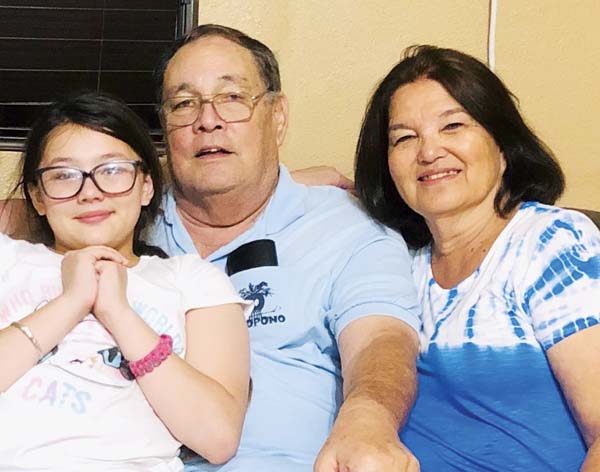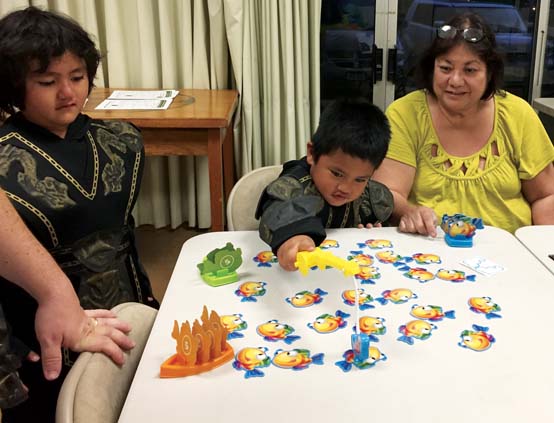

Aliyah Cabebe, 12 (from left), sits with grandparents Tony Lemmo and Roni Tavares-Lemmo in November. The “grandfamily” attends monthly GRANDcares family nights to network and play games with other children and adults. — Photo courtesy Roni Tavares-Lemmo
Like many grandparents on Maui, Roni Tavares-Lemmo and her husband have become the primary caregivers for their granddaughter.
They helped take care of her from the time she was born, and now they’re her full-time guardians.
“We are continually looking for ways to make her quality of life better and at the same time ours,” said Tavares-Lemmo, 70, an educational assistant at Kahului Elementary School.
Along the way, the Tavares-Lemmo family and many other “grandfamilies” have been helped by a program that aims to provide services for Hawaii and Colorado households in which grandparents and other relatives, such as aunties, uncles and great-grandparents, are raising the children.
“Grandfamilies have incredible strengths, and this program focuses on building on those strengths so that grandfamilies thrive,” said Heather Greenwood-Junkermeier, who’s also the University of Hawaii at Manoa extension agent for Maui County. “We looked everywhere and nothing existed, which is why we created (the program).”

Havanah (from left) and Ryker Tanji and grandmother Marlynn Tanji play during a GRANDcares family networking night at UH-Maui in 2017. — Photo courtesy Heather Greenwood-Junkermeier
Specializing in aging and intergenerational programs, Greenwood-Junkermeier directs GRANDcares team members at UH-Manoa and the University of Colorado, which are partners in the program.
In the future, she said that the program will try to expand across Hawaii; classes are currently held on Maui and Oahu only.
The GRANDcares Youth Club program is designed for children between the ages of 8 and 12 who are raised by their grandparents or other relatives. The program is filled with activities to help them build leadership skills, reduce stress, set and reach healthy goals and connect with others.
The program offers 2 1/2-hour sessions once a week, over seven weeks.
The curriculum for GRANDcares Youth Club is designed for the 8-12 age group, because if they’re younger, the activities won’t keep their attention and “they really wouldn’t understand the purposes of the activities,” Greenwood-Junkermeier said.
While there have been youths as old as 14 taking classes, most served as mentors for the younger kids.
“This helps because they have a leadership role, and because of that leadership role, it is OK that some of the activities may seem like they were created for youth younger than themselves, which they were,” she added.
The organization also facilitates a Grandparent Program, which offers six weeks of classes to caregivers to help reduce stress, increase self-care and strengthen family resilience.
“The idea behind both the grandparents and the grandchildren learning similar tools is that when they go home, they can work together to practice those tools,” she said.
According to Tavares-Lemmo, GRAND-cares “gave me so many tools to help us navigate the raising of our granddaughter” since joining the program in 2017.
“We have learned how to raise our granddaughter without guilt, by accepting that we don’t always have the right answers, by being open-minded and willing to try more than one way to make a difficult situation better, and by just loving her and doing the best we can to make her life a good one,” she said.
Tavares-Lemmo and her husband became full-time guardians when their granddaughter turned 4. The girl, now 12, attends weekly GRANDcares youth sessions, and together they look forward to the monthly Grandfamily Nights where they meet, talk story and eat dinner with other adults and children.
“As grandparents raising grandchildren, it helps to have support,” Tavares-Lemmo said. “Many times it’s very overwhelming and you may just need a listening ear and some simple tricks to make your life a whole lot more manageable.”
According to the GRANDcares program, about 17,000 (5 percent) children in Hawaii live with a relative with no parent present.
About 12,500 grandparents are responsible for grandchildren who live with them. Of those, 24 percent do not have parents present, 50.5 percent are under 60 years of age, 59 percent are working, 15 percent are in poverty, 23 percent have a disability and 22 percent are unmarried.
Statistics often change, though, because not all grandfamily situations are permanent or long term.
However, overall, grandfamilies are more common in Hawaii, where multicultural and multigenerational households are the norm.
“The idea of having a grandparent is very comfortable and more normal,” Greenwood-Junkermeier said.
Some of the many reasons that relatives become the sole guardian may include the death of a parent, mental or physical health challenges of the parent, incarceration, homelessness of a parent, substance abuse and military deployment.
Greenwood-Junkermeier added that grandparents who are raising grandchildren come from all races, ethnicities, educational backgrounds and income levels.
“Grandchildren do better academically, behaviorally, and have fewer run-ins with the law when they are raised by grandparents as opposed to those children who enter foster care when their parents are unable to care for them,” she said. “We know that when a parent is unable to raise their child or children, if those children stay with family members rather than enter the foster care system and are cared for by non-family members, everyone does better.”
Children raised in grandfamilies seem to have more stability because grandparents, or other relatives, know the family situation, they already love the children, and “are committed to keeping the family together and passing on family values and culture.”
However, one of the challenges is that grandparents often focus all their attention on the child and put their own needs last.
This can increase stress levels and negatively impact health, especially if the child has past experiences with neglect or abuse, for example.
“That sort of trauma exposes them to things we don’t want them to go through,” Greenwood-Junkermeier said. “A lot of the youth that come, come to us with incredible strength. . . . They may have had to grow up really quickly.”
Additionally, grandparents are more likely to have chronic conditions that are more common with age, such as high blood pressure, heart problems and diabetes.
Tavares-Lemmo, who already raised two children prior to her granddaughter, said that one challenge is that they don’t have the same energy and stamina.
“We also feel sorry for our little one that we are unable to do some of the physical things she could enjoy and we cannot run and play with her like a young parent can,” she said.
Another challenge grandfamilies might face is added expenses, especially if the new guardians are retired and living on a fixed income.
“What we don’t want to see is that grandparents become sick or burned out and unable to continue raising their grandchildren, which may lead to them ending up in foster care,” Greenwood-Junkermeier said. “This is what the program is focused on — taking their strengths, building on them, and providing support and information that helps them to maintain their health and allow them to keep their families together.”
The organization is currently seeking applicants with classroom management experience to register for GRANDcares Youth Facilitator Certification Training and Youth Club Program Assistant Training, which were postponed to March 28 at the Community Services Building at UH-Maui College.
This is only the second time that the facilitator training will be conducted on Maui.
Scholarship and stipend opportunities are available with training, which includes learning about the program’s mission and how to work with kids raised in grandfamilies. Part-time facilitators also will spend four additional hours doing online training.
To apply for the program or for scholarship and stipend information, contact Greenwood-Junkermeier at heather8@hawaii.edu or (808) 269-7396.
For more information, visit grandcares.colostate.edu.
* Dakota Grossman can be reached at dgrossman@mauinews.com.